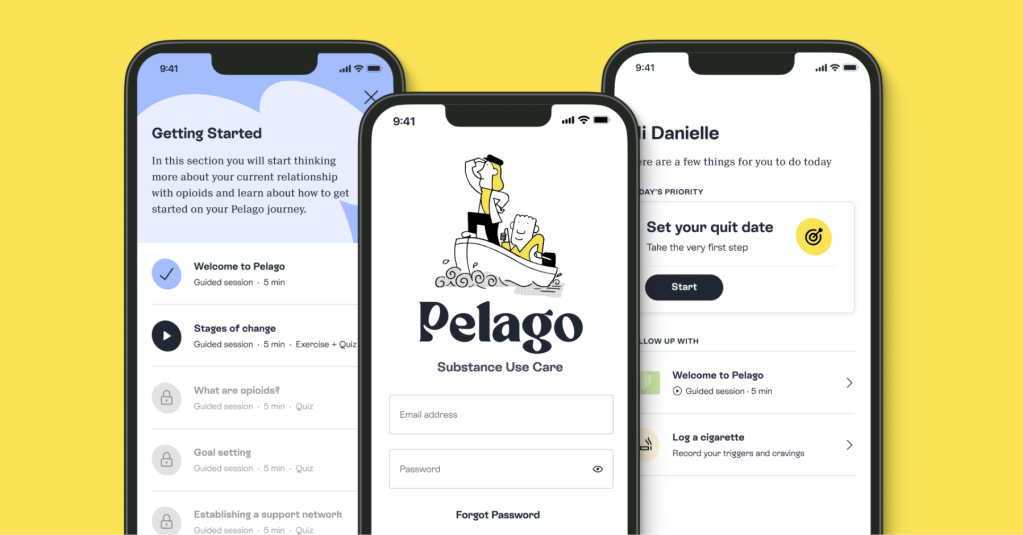Pelago, Y Combinator-backed telehealth company that uses cognitive behavioral therapy (CBT) to help treat people with tobacco, alcohol and opioid addictions, said Thursday it had raised a $58 million Series C round.
The recent funding, which brings its total raised to $151 million since being founded in 2017, comes two and a half years after Pelago, formerly known as Quit Genius, closed a Series B of $64 million amid the COVID pandemic.
Yusuf Sherwani, co-founder and CEO of Pelago, told TechCrunch that the company plans to use the proceeds to bring on more users, advance its clinical research efforts, and develop further products. Most recently, the company expanded its offering to include virtual therapy sessions and services for adolescents across its footprint. The virtual clinic’s medication-assisted treatment for substance use disorders is available across 50 states for adults and teens. It treats across all acuity levels along with co-occurring mental health conditions.
Since its Series B, Pelago has experienced an impressive 11x revenue surge and claims to have 100% client retention. The company did not provide the baseline of its revenue. Its full-time headcount has also tripled from 50 in 2021 to 150, demonstrating its rapid expansion, Sherwani said.
Sherwani, Maroof Ahmed (COO), and Sarim Siddiqui (head of product) all met at medical school before going on to found Pelago. The impetus for starting the company came after the trio witnessed the devastating effects of smoking and other addictions: as the company explains, substance addiction and abuse exist on a spectrum, with every individual’s experience and situation needing nuanced approaches, but straightforward medicalized approaches are often not a silver bullet. CBT and longer-term approach that comes with it have been shown to be effective in helping many figure out how to identify and work on issues. Combining this knowledge with advances in technology, and growing acceptance for telehealth solutions, the co-founders created a solution platform, Pelago.
The company does not sell directly to consumers. Instead, it partners with employers and healthcare benefit providers, who in turn provide it as a service, respectively to employees or health plan members when they are actively seeking treatment for themselves (or their families if they are covered in the plans). The CBT is currently focused around substance abuse, specifically alcohol, tobacco and opioids.
Pelago says its remote CBT program includes a physician-led care team of physicians, nurses, counselors, and coaches. The company diagnoses each user and develops a personalized care plan for users. Pelago members have regular sessions with virtual care teams in the app, consisting of health coaches or licensed drug and alcohol counselors. Its in-app telehealth capabilities include video and audio calling and a direct-to-therapist chat interface. Therapists also can request structured wellness checks for their members.It also offers PelagoRx, a medication-assisted treatment (MAT) through confidential prescriptions
Currently, Pelago has more than 100 enterprise customers across a variety of industries — mining, manufacturing, technology, construction, education, and healthcare among them.
According to the company’s website, its registered users were more than 750,000 as of August 2023. TechCrunch reported that the outfit had around 300,000 registered users in May 2018.

“Pelago offers its integrated substance use management to employer and health plan populations, with specialized treatment for tobacco, alcohol, and opioid use disorders along with support for adolescents,” the company CEO told TechCrunch in an interview.
Apart from the fact that medical approaches can be hit and miss, Sherwani said, they can also be very expensive. According to a survey, around 67% of adults in the U.S. who struggle with an alcohol or illicit drug use disorder remain in the workforce. But the cost of treating substance use disorders for each individual enrolled in employer-sponsored insurance can be very expensive, with an average of a minimum of $15,640 annually.
Last year, Pelago published an internal study that claimed using its service reduced medical claims by $9,367 annually per participant compared to a control group. According to the CEO, its users are five times more likely to quit smoking in one year with the Pelago platform than other programs.
In addition to its virtual therapy interface, the company is investing in bringing more tech to bear on its business. For example, it has introduced an AI-powered assistant, Pelago Chart, for clinical teams to take notes more automatically.
Existing backer Atomico, which doubled down on the Series C investment on the back of Pelago’s growth, led the funding, with participation from other previous investors like Kinnevik AB, Octopus Ventures and Y Combinator. New investors Eight Roads and GreyMatter Capital also participated in the round.
https://techcrunch.com/2021/12/20/how-one-founder-saw-the-value-of-remote-care-for-addiction-treatment-long-before-the-pandemic/
Quit Genius raises $11M Series A to expand into opioid, alcohol addiction treatment































Comment